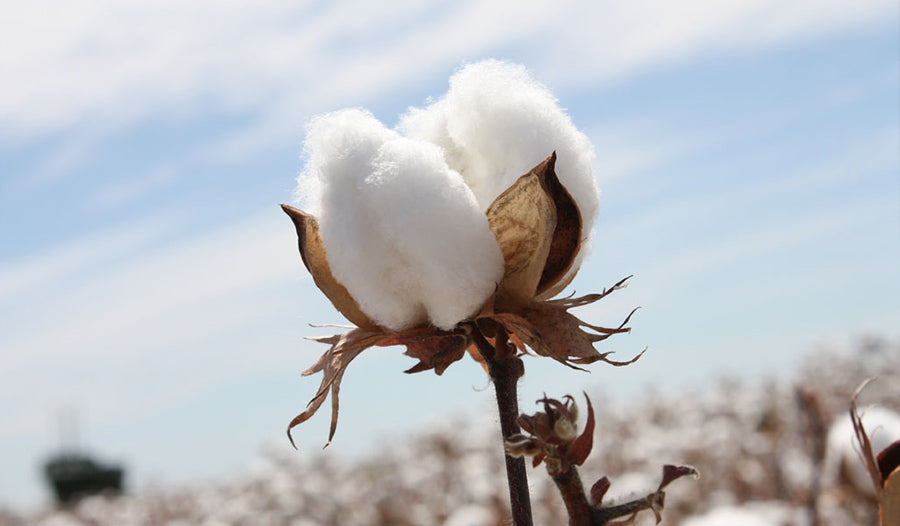
COTTON ON

It is impossible to measure the importance of cotton in the history of the modern world.
The most widely used staple fibre, cotton is soft and lightweight. Its fabric is breathable, durable and easy on the skin. Cotton was the influential crop that contributed to the rapid development of the Industrial Revolution, and despite its pure hue, has a dark history as the primary driver of the global slave trade.

It later became the symbol of Mahatma Ghandi's independence movement against British Colonisation and continues to be contested in the inequalities of the mass production of clothing. However, cotton's problematic history and mass appeal overlook the beauty and delicacy of the fluffy, cottonwool-like fibres of the Gossypium plant and the textiles that are produced from it.
We're excited to be hosting an online talk, next week on Wednesday 11 May, which will bring together academics, cotton producers, designers and cotton activists to discuss the legacy of cotton from historical and contemporary perspectives. Read on to explore just some of our speakers:

Sally Fox of Foxfibre®️
An iconic figure in the fashion industry, Sally Fox has been spinning, knitting and weaving since childhood. It was her passion for making that led her to see this market potential for long-staple organic cotton. It was the financial support of the crafting community that allowed her to quit her job as a scientist and devote her life to developing cross-pollinated varieties of cotton. Heirloom cotton was once abundant and grew in a rainbow of shades including green, yellow, blue and brown. Fox did what no one thought was possible. She hand bred ancient, genetically diverse naturally pest-resistant varieties into long-staple cotton. Getting these spectacular cotton into mainstream industry use remains her ultimate goal.

Barbara Hahn - Professor of History at Texas Tech University
Hahn will explore Cottonopolis, the Industrial Revolution and the mechanisation of textile production in late eighteenth-century Britain – the classic case of rapid and revolutionary technological change. It was also, like all historical events, a product of the interactions between local contingencies and global processes. The town of Manchester was the prism that focused world systems into new configurations as its merchants invested capital in machinery and factories. This presentation explores the specific contingencies of the location, its laws and people, to explain the timing of mechanisation and its reconfiguration of world economic power.
Marzia Lanfranchi
Marzia Lanfranchi's mission is to shape a healthier fashion system by breaking companies’ silos and building bridges across supply chain segments. She has worked in various roles, ranging from fabric development at Burberry, responsible sourcing and social compliance for brands, retail and marketing to even the agricultural industry. Thanks to her experience–from seed to store–she has a thorough understanding of how supply chains operate and is well-versed in the key sustainability challenges facing the textile industry today.

Giorgio Riello
Giorgio Riello is Chair of Early Modern Global History at the European University Institute. He is the author of Cotton (CUP 2013 – winner of the World History Association Book Prize 2014) and has published several other books on global trade between Europe and Asia, and on material culture and fashion in the early modern period.
Reillo will discuss Indian cotton textiles and the Atlantic trade. From the late seventeenth century, large quantities of cheap cotton cloth were sold to the West Indian plantations as well as to North American and African markets. This was cloth produced in India or copies made in Europe and sold across the Atlantic. It was used to purchase enslaved people who were transported from West Africa to the sugar and cotton plantations of the West Indies and the Americas. This paper shows the importance of Europe in connecting the Indian and Atlantic Oceans and the global scale of the textile trade in the seventeenth and eighteenth centuries.
Trevor Burnard
Trevor Burnard is Wilberforce Professor of Slavery and Emancipation at the University of Hull and Director of the Wilberforce Institute. He is a specialist in the Atlantic World and slavery in plantation societies.
Burnard's talk will look at cotton in global context and in particular its particular history in the eighteenth and nineteenth century in India, Africa, Europe (especially Britain), the West Indies and the United States. It will look not just at the production of cotton and its close relationship with both slavery and capitalism but in how cotton was consumed by discerning customers, especially women.

Adele Stafford
Adele Stafford is a textile artist whose work is an ongoing investigation of fibre as a material and its connection to agriculture and place. Over the last ten years, she's worked under the name Voices of Industry, producing hand woven garments as representative of a particular piece of land and the stewards who reside there. Adele has extensive experience in the sustainability sector for apparel and textiles and currently works with leading brands and manufacturers on addressing climate impact throughout the value chain.
Cotton has long embodied a complicated and sordid narrative, in spite of its ubiquity as a dominant natural fibre. Through both historical and contemporary examples, she'll examine cotton's agricultural legacy and its role in a vastly changing climate.
--
Last chance! Our Cotton Online Talk will take place next week on Wednesday 11 May.
Book your ticket now, and find out more about our speakers here:


1 comment
Thank you for organising!